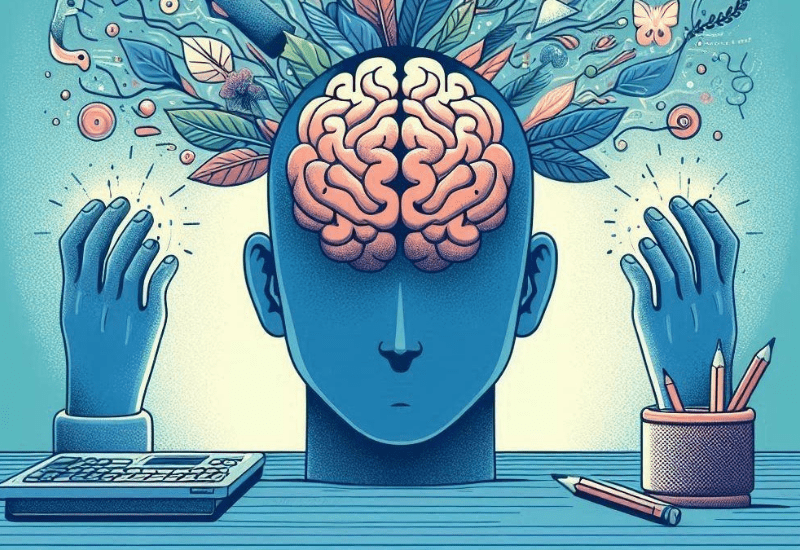Have you ever found yourself thinking about something you didn’t want to think about? Maybe you were trying to concentrate on your work, but your mind kept thinking about a movie you watched. Or maybe you were worrying about something that might never happen. It’s almost like your mind has a mind of its own!
Our thoughts are powerful. They shape how we feel, what we do, and even who we become. If your thoughts are mostly negative or chaotic, your life might feel stressful and out of control. But if you learn to manage your thoughts, you can feel calmer, more focused, and in charge of your own life.
In this blog post, I’ll show you simple ways to take control of your thoughts and master your mind. Think of your mind like a TV remote. Sometimes, your brain flips through channels on its own, but you have the power to choose what you focus on.
Strategies to Control Your Thoughts (Detailed and with Real-Life Examples)

Here’s how you can master your mind with easy, practical strategies. These tips will help you take control of your thoughts, so you can feel calmer, make better decisions, and stay focused on what matters.
1. Feed Your Mind with Positive Information
Just like your body needs healthy food to stay strong, your mind needs healthy thoughts to stay focused and happy. Imagine eating junk food all day long—how would you feel? Tired, sluggish, maybe even sick. Now imagine filling your mind with negative thoughts, bad news, or constant complaints. Your mind feels just as bad.
Imagine you spend hours scrolling through social media and seeing negative news, gossip, or people complaining about their day. After a while, you start feeling down or anxious, even if nothing bad has happened to you. To avoid this, you can choose to follow accounts that share inspiring, educational, or positive content. You can also limit your time on social media so that you’re not constantly bombarded with negativity.
Start your day by reading or listening to something positive. It could be an inspiring podcast, a chapter from a motivational book, or simply watching a video that teaches you something new. This helps you “feed” your brain with good thoughts that set the tone for the rest of your day.
2. Limit Distractions
Our minds are constantly bombarded with distractions, from social media notifications to random thoughts. These distractions can make it hard to focus on what’s important. It’s like trying to have a conversation with someone while a loud TV is blaring in the background—you can’t concentrate!
Let’s say you’re trying to study for a test, but every few minutes, your phone buzzes with a new notification. Instead of focusing on your study material, your brain keeps shifting back and forth between social media and your work. This not only wastes time but also makes it harder to retain information. To avoid this, you can put your phone on silent or keep it in another room while you study.
Schedule “distraction-free” time each day. During this time, turn off your phone, avoid checking social media, and focus on a task that’s important to you—whether it’s studying, reading, or working on a project. Even 30 minutes of focused time can make a big difference!
3. Engage Your Mind Intentionally
When your mind has nothing to focus on, it tends to drift into negative or unproductive thoughts. This is why it’s important to keep your brain engaged with meaningful activities. Think of your brain as a muscle—if you don’t use it, it gets weak!
Imagine you have a lot of free time, but instead of doing something productive, you end up watching TV for hours. While relaxing is important, too much idle time can make your brain lazy and lead to overthinking or negative thoughts. To keep your mind sharp, try learning a new skill, solving puzzles, or starting a creative hobby like painting or writing.
Pick an activity that challenges your brain. This could be learning a new language, trying out a DIY project, or even playing strategy-based games like chess. Engaging your mind in meaningful ways helps you stay focused and reduces idle, negative thinking.
4. Practice Mindfulness
Mindfulness is the practice of paying attention to the present moment without letting your mind wander. Most of the time, we’re either thinking about the past or worrying about the future, which makes us feel anxious or distracted. Mindfulness brings us back to “right now” and helps us regain control of our thoughts.
Imagine you’re eating lunch, but instead of enjoying the meal, you’re thinking about a conversation you had earlier or worrying about an upcoming meeting. You’re not really present, and your mind feels scattered. Practicing mindfulness means focusing on your food, the taste, the smell, and being present in that moment. This practice helps calm your mind and brings you clarity.
Try a simple mindfulness exercise. Take a few minutes each day to focus on one activity, like eating, walking, or even brushing your teeth. Pay attention to how it feels, smells, or sounds. This helps train your brain to focus on the present, which reduces distractions and stress.
5. Ask Yourself Questions
When you face negative or confusing thoughts, one powerful tool is to ask yourself questions. This helps you think critically about your thoughts and figure out if they’re helpful or harmful. It also helps you make better decisions instead of reacting emotionally.
Let’s say you’re preparing for a big exam, and a thought pops into your head: “I’m going to fail.” Instead of letting that thought take over, ask yourself, “Is this thought really true? Have I prepared enough? What can I do to improve my chances of success?” Asking these questions helps you challenge negative thoughts and focus on solutions instead of problems.
The next time you have a negative thought, stop and ask yourself: “Is this thought true? Is it helping me? What can I do to change it?” This simple technique helps you take control of your thinking instead of letting negative thoughts control you.
6. Avoid Unstructured Thinking
Unstructured thinking happens when your mind wanders aimlessly, jumping from one thought to another without focus. This often leads to distractions or unnecessary stress. To avoid this, you need to recognize when your mind starts drifting and bring it back to the present task.
Have you ever started thinking about what to make for dinner, and then your mind jumps to something embarrassing that happened years ago? Before you know it, you’re lost in random thoughts. This is unstructured thinking, and it can make you feel scattered. Instead, you can gently remind yourself to stay focused on what you were originally thinking about—like planning your dinner.
When you notice your mind drifting, gently bring it back to the present moment. You can say to yourself, “Let’s focus on what I’m doing right now.” This practice helps you stay on track and prevents your mind from wandering into unproductive territory.
7. Meditate Daily
Meditation is like going to the gym for your brain. It helps you practice controlling your thoughts and focusing on one thing at a time. When your mind wanders during meditation, you practice bringing it back to your breath, which strengthens your ability to focus in everyday life.
Let’s say you’re feeling stressed because you have too many things on your mind. By meditating for just 5-10 minutes a day, you can learn to calm your thoughts. Focus on your breathing—inhale deeply and exhale slowly. Whenever your mind wanders (and it will!), gently bring your attention back to your breath. Over time, this practice helps you gain more control over your thoughts, even outside of meditation.
Start with just 5 minutes of meditation a day. Find a quiet place, close your eyes, and focus on your breath. If your mind wanders, just bring it back without judgment. Meditation might feel challenging at first, but it gets easier with practice.
8. Observe How You Think
Pay attention to how your thoughts flow throughout the day. Are they mostly positive or negative? Do you often think about the past, present, or future? Understanding your thinking patterns can help you gain better control over them.
Imagine you’re sitting in class, but instead of paying attention, you’re thinking about something embarrassing that happened last week. This is a pattern of dwelling on the past, which can make you feel anxious or stuck. By observing this, you can gently remind yourself to let go of the past and focus on the present.
Throughout the day, take a moment to observe your thoughts. Are they helping you or holding you back? If you notice a pattern of negative thinking, try to shift your focus to something positive or productive.
9. Make Habits
Good habits make controlling your thoughts easier because they become automatic. Instead of constantly having to think about how to stay focused, your brain can fall back on helpful habits that keep you on track.
Let’s say you want to make reading a daily habit. At first, it might be hard to remember to do it. But if you set aside 15 minutes each night before bed, eventually it becomes a routine. Once it’s a habit, you won’t have to think about it—it will just happen naturally.
Pick one small habit that supports your mental health, like reading for 10 minutes before bed or writing down your thoughts every morning. The more you repeat this habit, the easier it becomes to control your thoughts and stay focused.
10. Invest in Yourself
Investing in yourself means spending time and effort on personal growth. Just like working out strengthens your body, learning new things strengthens your mind. The more you invest in yourself, the sharper and more focused your mind becomes.
Imagine you decide to learn a new skill, like playing a musical instrument or learning a language. As you practice, you not only improve at the skill but also train your brain to focus and stay disciplined. This builds mental strength that helps you control your thoughts in other areas of life too.
Dedicate some time each week to learning something new. It could be as simple as watching educational videos, reading books, or taking an online course. Investing in your mind keeps it active and focused.
11. Manage Stress
Stress can make it hard to think clearly and stay focused. When you’re stressed, your brain is overwhelmed, and it’s easy for negative thoughts to take over. Learning how to manage stress helps you stay calm and regain control of your mind.
Imagine you have a big presentation coming up, and you’re feeling overwhelmed. Stress can make you doubt yourself or think about worst-case scenarios. To manage stress, you can practice deep breathing, take short breaks to clear your mind, or do some light exercise to release tension.
When you’re feeling stressed, try this simple breathing exercise: inhale slowly for four seconds, hold for four seconds, and exhale for four seconds. Repeat this a few times to calm your mind and body.
12. Write for Mental Clarity
Writing down your thoughts helps you process them better. When your mind feels cluttered, putting your thoughts on paper can help you organize them and gain clarity. It’s like cleaning out your mental closet!
Let’s say you’re feeling overwhelmed by everything you need to do. By writing a to-do list or journaling about your feelings, you can make sense of the chaos. Writing helps you see things more clearly and prioritize what’s important.
Try journaling for just 5-10 minutes each day. Write down anything that’s on your mind—worries, plans, or even random thoughts. This helps clear your mind and gives you a sense of control over your thoughts.
13. Use Focused Distractions
Sometimes, short, focused distractions can refresh your mind and help you regain focus. The key is to use distractions intentionally—don’t let them take over your whole day!
If you’ve been studying for hours and your brain feels foggy, taking a 5-minute break to stretch, get some fresh air, or do something fun can help reset your focus. The key is to keep it short so you can get back to work with renewed energy.
Schedule short, intentional breaks during your day. Try setting a timer to work for 25 minutes, then take a 5-minute break to relax or move around. This helps keep your mind sharp and prevents burnout.
14. Work on Managing Stress
In addition to using short-term techniques to manage stress, it’s important to develop long-term strategies for handling stress. When you have healthy ways to cope with stress, your mind is better equipped to stay focused and calm during challenging situations.
Let’s say you’re preparing for final exams, and the pressure is building up. Instead of letting stress take over, you could develop healthy habits like regular exercise, meditation, or talking to a friend about your worries. These strategies help you manage stress over time, so it doesn’t overwhelm your mind.
Try incorporating stress-relief activities like yoga, exercise, or meditation into your weekly routine. These activities help you stay calm and clear-headed, even during stressful times.
15. Seek Therapy When Needed
Sometimes, we all need a little extra help in managing our thoughts and emotions. Therapy can provide you with tools to better understand and control your mind. There’s no shame in seeking help when you need it.
If you’re struggling with anxiety, depression, or overwhelming negative thoughts, a therapist can help you develop personalized strategies to regain control. Therapy provides a safe space to talk about your feelings and learn practical tools to manage them.
If you’re feeling overwhelmed by your thoughts or emotions, consider reaching out to a therapist or counselor. They can help you better understand your thought patterns and provide guidance on how to manage them.
16. Change Your Perspective
Sometimes, the way we think about a situation can make it feel much worse than it is. Learning to change your perspective, or “reframe” your thoughts, can help you see challenges in a more positive light.
Imagine you didn’t do well on a test, and your first thought is, “I’m not smart enough.” This thought can make you feel discouraged and stop you from trying again. But if you change your perspective and think, “This is a chance for me to learn and improve,” it becomes an opportunity instead of a failure.
When you’re faced with a negative thought, try to reframe it in a more positive or constructive way. Instead of thinking, “I can’t do this,” try thinking, “This is a challenge, but I can figure it out.” This shift in perspective helps you stay motivated and reduces stress.
Conclusion: Take Control of Your Mind Today!

Remember, your thoughts don’t have to control you. With the right strategies, you can start managing your mind and living a more peaceful, focused life. Whether it’s practicing mindfulness, limiting distractions, or meditating for a few minutes each day, small changes can lead to big results.
Start with one or two tips from this post and give them a try. The more you practice controlling your thoughts, the better you’ll get at it. So take action today—your mind is waiting for you to take control!
Why is it important to control your thoughts?
Controlling your thoughts is crucial because thoughts directly influence your emotions, behavior, and decisions. Negative, unstructured thoughts can lead to anxiety, stress, and poor decision-making, while positive, focused thinking improves mental clarity, productivity, and overall well-being.
How can mindfulness help in controlling thoughts?
Mindfulness helps by bringing attention to the present moment, allowing a person to observe their thoughts without judgment. This practice reduces mental distractions and helps regain control over wandering thoughts.
What should be avoided to prevent unproductive thinking?
To prevent unproductive thinking, it’s important to limit exposure to distractions like excessive social media use, negative news, or idle activities that lead to overthinking or mental wandering.
How do habits influence thought control?
Positive habits, like reading, exercising, or practicing gratitude, reinforce productive thinking patterns. Repeating these habits over time makes them second nature, helping the mind stay focused and disciplined.
When should therapy be considered for controlling thoughts?
Therapy should be considered when a person feels overwhelmed by persistent negative thoughts, anxiety, or emotional distress. A therapist can offer personalized tools to help regain control of thoughts and manage mental health challenges.
